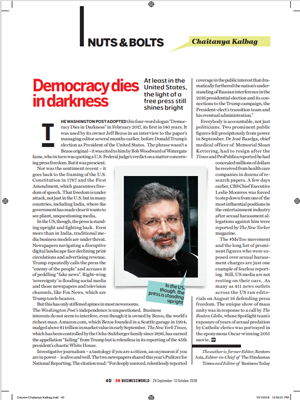DEMOCRACY DIES IN DARNESS
[Business World]
Published date: 29 Sep 2018
The Washington post adopted this four-word slogan “Democracy Dies in Darkness” in February 2017, its first in 140 years. It was used by its owner Jeff Bezos in an interview to the paper’s managing editor several months earlier, before Donald Trump’s election as President of the United States. The phrase wasn’t a Bezos original– it was cited to him by Bob Woodward of Watergate fame, who in turn was quoting a U.S. Federal judge’s verdict on a matter concerning press freedom. But it was prescient.
Nor was the sentiment recent – it goes back to the framing of the U.S. Constitution in 1787 and the First Amendment, which guarantees freedom of speech. That freedom is under attack, not just in the U.S. but in many countries, including India, where the government has made clear it wants to see pliant, unquestioning media.
In the US, though, the press is standing upright and fighting back. Even more than in India, traditional media business models are under threat. Newspapers navigating a disruptive digital landscape face declining print circulations and advertising revenue. Trump repeatedly calls the press the “enemy of the people” and accuses it of peddling “fake news”. Right-wing ‘sovereignty’ is flooding social media and those newspapers and television channels, like Fox News, which are Trump torch-bearers.
But this has only stiffened spines in most newsrooms.
The Washington Post’s independence is unquestioned. Business interests do not seem to interfere, even though it is owned by Bezos, the world’s richest man. Amazon.com, which Bezos founded in a Seattle garage in 1994, nudged above $1 trillion in market value in early September. The New York Times, which has been controlled by the Ochs-Sulzberger family since 1896, has earned the appellation “failing” from Trump but is relentless in its reporting of the 45th president’s chaotic White House.
Investigative journalism – a tautology if you are a citizen, an oxymoron if you are in power − is alive and well. The two newspapers shared this year’s Pulitzer for National Reporting. The citation read: “For deeply sourced, relentlessly reported coverage in the public interest that dramatically furthered the nation’s under- standing of Russian interference in the 2016 presidential election and its connections to the Trump campaign, the President-elect’s transition team and his eventual administration.”
Everybody is accountable, not just politicians. Two prominent public figures fell precipitously from power in September. Dr José Baselga, chief medical officer of Memorial Sloan Kettering, had to resign after the Times and ProPublica reported he had concealed millions of dollars
he received from health care companies in dozens of research papers. A few days earlier, CBS Chief Executive Leslie Moonves was forced to step down from one of the most influential positions in the entertainment industry after sexual harassment allegations against him were reported by The New Yorker magazine.
The #MeToo movement and the long list of prominent figures who were exposed over sexual harassment charges are just one example of fearless reporting. Still, US media are not resting on their oars. As many as 411 news outlets across the US ran editorials on August 16 defending press freedom. The unique show of mass unity was in response to a call by The Boston Globe, whose Spotlight team’s exposure of years of sexual predation by Catholic clerics was portrayed in the eponymous Oscar-winning 2015 movie.






